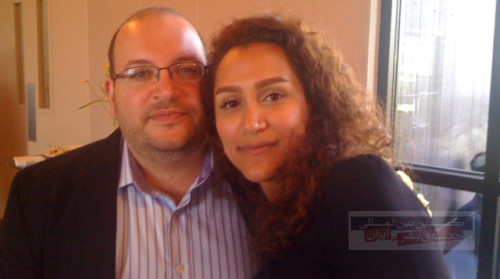PHOTO: Washington Post reporter Jason Rezaian and his wife, journalist Yeganeh Salehi
LATEST: Rouhani Presents Budget to Parliament
Jason Rezaian, the Washington Post correspondent in Iran, has been officially charged after more than four months in prison, according to the Post.
“A source familiar with the case” said the specific charges were not immediately clear, at least to those who were not present in the courtroom. The hearing lasted 10 hours.
On Thursday, Iranian authorities said that Rezaian’s detention was being extended to mid-January because the investigation against him is continuing.
Rezaian, an Iranian-American national, was seized July 22 with his wife Yeganeh Salehi — a journalist for the Gulf-based The National — and two other people who were soon released. Salehi was freed on bail in early October.
It could take up to a month for a trial date to be set. At that point, Rezaian’s attorney might be permitted to review them and speak with the journalist.
US Secretary of State John Kerry said in a statement on Sunday that the “Iranian government continues to deny our repeated requests for Consular Access to Jason by our Protecting Power, the Swiss, so we are unable to check on his condition or ensure adequate legal representation”:
[I have] repeatedly raised Jason’s case, and the other cases of detained or missing U.S. citizens, directly with Iranian officials.
Jason poses no threat to the Iranian government or to Iran’s national security. We call on the Iranian government to drop any and all charges against Jason and release him immediately so that he can be reunited with his family.
High-level Iranian officials have repeatedly said that Rezaian is being investigated in according with the Islamic Republic’s laws and judicial system. Speaker of Parliament Ali Larijani insisted in October, “There should be no doubt that we don’t want to send anybody to jail with no good reason…I hope that this will come to an end and be concluded as soon as possible.”
Mohammad Javad Larijani, a high-level judiciary official and the Speaker’s brother, repeated earlier this week that he hoped the case would be concluded “as soon as possible….Let us hope that this fiasco will end on good terms.”
Rouhani Presents Budget to Parliament
President Rouhani has presented the draft budget for 2015-2016 to Parliament.
The budget for the year, beginning March 21, is 838 million Tomans (about $311 billion at official exchange rates), a 4.3% increase on 2014-2015.
Rouhani’s officials had said that the budget will be based on oil revenues of about $80/barrel, down from $100/barrel in the 2014-2015 budget because of the recent 25% fall in global oil prices.
It is unclear how the Government will fund an increased budget, with the continuing restrictions on Iran’s oil exports because of US-led sanctions and the decline in income. However, the President promised to increase non-oil revenues as part of the effort:
Statistics show that Iran’s non-oil exports have reached $31.5 billion by mid-November, and this indicates a 19.7% growth as compared to last year. We hope by the end of the [Iranian] year, our non-oil exports will pass $50 billion.
Rouhani also focused on the goal of curbing inflation: “I once again explicitly announce that the administration considers cutting inflation among its great achievements and is resolute to safeguard this great accomplishment, therefore the next year’s budget bill has been drafted with the aim of controlling inflation.”
He indicated that money supply would be curbed to achieve the goal.
The Government inherited an inflation rate of more than 40% in August 2013 from the Ahmadinejad administration, and has brought it below 20%.
The budget includes a proposed increase of 32.5% in defense spending, to about $10 billion.
The draft budget will go through a 40-day period of review and debate before it is considered for approval by the Majlis and then by the Guardian Council.
Iran Denies Agreement to “Snap” Inspections of Nuclear Facilities
The spokesman of Iran’s Atomic Energy Organization has denied Tehran’s agreement to “snap” inspections of its nuclear facilities.
Some Western officials have put out the report that Iran agreed to the inspections by the International Atomic Energy Agency without notice, as part of the extension to July 1 of talks between the Islamic Republic and the 5+1 Powers.
However, Behrouz Kamalvandi said, “The IAEA’s inspections of Iran’s peaceful nuclear program will be carried out on a monthly basis, just like before….The extent and type of inspections of Iran’s nuclear activities will continue on its regular basis during the seven-month period of talks extension.”
Fars News is also denying, from “a source close to the Iranian team of nuclear negotiators”, that Iran agreed to suspend testing of advanced centrifuges to replace its current 40-year-old IR-1 models: “This is not true at all and the trend of R&D on enrichment is moving along its natural track at the Atomic Energy Organization of Iran.”
However, the source confirmed that Iran will continue to reduce the production of 20% enriched uranium.
Tehran has converted much of its 20% stock to fuel plates, which cannot be further enriched for military use, or diluted it to 5%.
US VP Biden: “Less Than Even” Chance of Nuclear Deal
US Vice President Joe Biden has told a high-profile American forum that there is a “less than even” chance of a comprehensive nuclear deal with Iran.
Biden said at the Saban Forum in Washington — funded by a staunch supporter of Israel — on Saturday that US sanctions had slowed the Iranian economy and nuclear initiative:
It’s frozen the programme, it’s given us a shot for a peaceful solution.
I tell you, I think it’s a less than even shot but it’s a shot, nonetheless.
Iran and the 5+1 Powers failed two weeks ago to complete a deal. Instead, they extended interim arrangements and talks to July 1.
The Vice President said the effort must be pursued, “This is not the time to risk a breakdown when we still have a chance for a breakthrough.”

